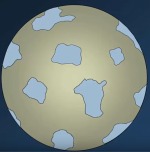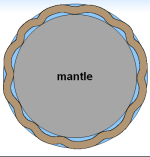Oh, I read it. It is clear what it states.
Genesis 1:9-10
9 And God said, Let the waters under the heaven be gathered together unto one place, and let the dry land appear: and it was so.
10 And God called the dry land Earth; and the gathering together of the waters called he Seas: and God saw that it was good.
The waters under the heaven were gathered together into
a. multiple places?
b. one place
Both.
Because "echad" is not a singular "one," but a "one" of unity.
This should give you an idea as to what the earth looked like by the end of the third day of creation:


As you can see, the "one" place was at ALL of the bottoms of the dips made by the pillars of the earth (the parts of the crust that dip down in the second image and rest on the mantle).
One united place.
Echad.
The word echad is one, singular
Wrong.
The NUMBER is singular, but it refers to a UNIFIED "one," not an absolute singularity.
Yes, God calls it "seas" plural here, as I already pointed out, but in other places, God refers to these "seas" as "sea" singular. Why? to distinguish the dry from the wet. Fish live in the sea, not dry land. Thus sea is singular, because only the sea is wet, the dry land is dry.
I addressed this already, but you never answered my question.
Was there one sea, total? or more than one sea, Oatmeal?
Context reveals the proper understanding.
AMEN!
Yes, it was day one. It was the only day one in all eternity in that context. There is no other day one in that context. It is the only day one that had those specific events take place. God spoke and the light appeared and God saw the light, and God considered it good and God divided the light from the darkness and God called the light day and the darkness He called night. That is the only day in scripture that those specific events took place. It is a singular day in God's plan and in history. There is no other day one that is remotely similar.
You still seem to be missing the point I'm making.
Again, echad was used, rather than rishon (the other Hebrew ordinal for "first").
Echad means BOTH "first" (as an ordinal) and "one" (a plural unity).
Thus there is no unity of multiple days in that day one.
I never said there was. You keep making straw man arguments. Focus!
Second is ordinal because it was the second day.
So why not use "rishon" for "first"? It would have fit with "sheni" better...
Dream on.
Throwing a tantrum doesn't make you right, Oatmeal.
Echad means both "first" (as an ordinal) and "one" (a plural unity).
"One rib" ("ahat missalotaw"), as you so succinctly pointed out, is just two "half ribs." A plural unity of one rib, made up of two halves.
When we look at the depth of what is represented by the singular word rib, we can see that is appropriately singular.
Singular, in that there is one rib, but not one of singularity because it's one singular item, rather, a plural unity of one rib, made up of two halves.
God clearly did not literally refer to a rib but the life blood of Adam.
Because you say so?
I may address the rest of your post later.
Please do.



